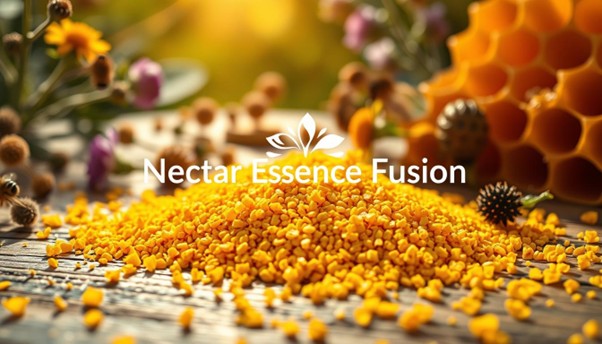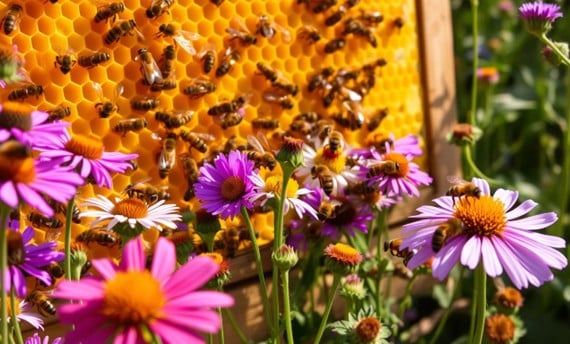Bee Pollen Benefits: Your Complete Guide to Nature's Perfect Superfood
Discover the amazing health benefits of bee pollen, nature's super-food. Learn how this nutrient-rich supplement can boost your well-being and vitality. Bee pollen for health!
Ochieng Palla
11/25/20245 min read


Looking to boost your wellness naturally? Bee pollen might be the answer you've been searching for. This incredible superfood, often called nature's most complete nutrient source, is revolutionizing how health-conscious individuals approach their daily nutrition. Our comprehensive guide explores the science-backed benefits of bee pollen for health and shows you exactly how to incorporate this golden treasure into your wellness routine.
What is Bee Pollen?
Bee pollen is a natural substance bees collect from flowers. It's packed with bee pollen nutrition like bee pollen vitamins, bee pollen minerals, bee pollen proteins, and bee pollen carbohydrates. Unlike honey or royal jelly, it's a key food for young bees (bee larvae), helping them grow.
The type of pollen bees collect change across the season based on changes of the dominant flowering patterns of local bee plants.
The Remarkable Nutrition Profile of Bee Pollen
Recent research from the Journal of Agricultural and Food Chemistry reveals that bee pollen contains over 250 active compounds, making it one of nature's most diverse nutritional sources. Here's what makes bee pollen nutrition so exceptional:
Proteins: Bee pollen is about 22% protein by weight, making it a valuable source of amino acids.
Vitamins: Rich in B-complex vitamins (B1, B2, B6) for energy metabolism and brain health.
Minerals: Includes calcium, magnesium, potassium, and zinc to support bone health, muscle function, and immunity.
Antioxidants: Contains flavonoids, phenolic acids, and carotenoids that neutralize harmful free radicals.
Enzymes: Improves digestion and boosts nutrient absorption.
Science-Backed Bee Pollen Benefits for Your Health
1. Energy and Stamina Booster
Bee pollen’s high protein and B-vitamin content support sustained energy release, combating fatigue and improving physical endurance. Studies suggest that athletes who consume bee pollen experience better recovery times and increased stamina.
2. Immune System Support
Bee pollen strengthens immunity by enhancing white blood cell activity and reducing inflammation. Its antimicrobial compounds protect against harmful pathogens, while antioxidants like flavonoids help your immune cells fight oxidative stress.
3. Supports Heart Health
Bee pollen contains rutin, a flavonoid that improves blood vessel strength and reduces cholesterol levels. This supports cardiovascular health by lowering the risk of hypertension and heart disease.
4. Improves Digestive Health
Enzymes in bee pollen, such as amylase and lipase, enhance the digestion of fats and carbohydrates. It also promotes a healthy gut microbiome, essential for immunity and nutrient absorption.
5. Promotes Skin Rejuvenation
The vitamins, minerals, and antioxidants in bee pollen nourish skin cells, reduce inflammation, and combat signs of aging. Bee pollen's combination of vitamins and antioxidants supports:
Collagen production
Skin cell regeneration
Protection against environmental damage
6. Allergy Response Management
Regular consumption may help reduce seasonal allergy symptoms by building natural immunity to local pollens.
How to Use Bee Pollen in Daily Life
Incorporating bee pollen into your routine is easy and versatile. Here are some simple ways to enjoy its health benefits:
Raw Consumption: Sprinkle bee pollen granules over salads, cereal, or yogurt for a crunchy nutrient boost.
Smoothies: Blend a teaspoon of bee pollen powder into your favorite fruit or vegetable smoothie for added protein and antioxidants.
Tea or Water: Stir bee pollen into warm water or herbal tea to create a soothing drink.


Your Daily Wellness Guide
Getting Started with Bee Pollen Supplements
Start with these easy incorporation methods:
Morning Boost Smoothie
1 cup almond milk
1 banana
1 tablespoon bee pollen powder
Handful of spinach
1 tablespoon honey Blend until smooth for natural energy support
Yogurt Power Bowl
Greek yogurt base
1 teaspoon bee pollen granules
Fresh berries
Drizzle of honey Perfect for pre-workout nutrition
Harvesting Bee Pollen Responsibly
Sustainable beekeeping practices ensure that harvesting bee pollen doesn’t harm bee populations. Ethical beekeepers only collect excess pollen, leaving enough to support the hive’s nutrition. By choosing ethically sourced bee pollen, you can enjoy its benefits while supporting environmental health.
It is important to note that fresh bee pollen has 20% to 30% water, making it prone to spoilage. It's therefore important to dry and store it properly.


Important Safety Considerations
While bee pollen offers numerous health benefits, it's important to start slowly and be aware of potential bee pollen side effects:
Who Should Exercise Caution?
People with known pollen allergies
Pregnant or nursing women
Individuals on blood-thinning medications
Those with compromised immune systems
Always start with a small amount (1/8 teaspoon) and gradually increase to assess tolerance.
Choosing Quality Bee Pollen Supplements
What to Look For:
Sourced from certified organic beekeepers
Free from pesticides and contaminants
Properly dried and stored
Third-party tested for purity
The Future of Bee Pollen Research
Current studies are exploring bee pollen's potential in:
Athletic performance enhancement
Anti-aging applications
Metabolic health support
Cognitive function improvement
Your Next Steps with Bee Pollen
Ready to experience the benefits of bee pollen for yourself? Start with these actionable steps:
Choose a high-quality bee pollen supplement
Begin with a small dose to test tolerance
Incorporate it into your daily routine using our recipe suggestions
Monitor your energy levels and overall well-being
Expert Tip
"The key to maximizing bee pollen benefits is consistency. Start small and make it a daily habit," advises Dr. Sarah Thompson, Nutritional Medicine Specialist.
Conclusion: A Natural Path to Better Health
Bee pollen represents one of nature's most complete superfoods, offering a wide range of health benefits backed by both traditional wisdom and modern science. By incorporating this natural supplement into your daily routine, you're taking a significant step toward supporting your body's natural wellness processes.
Have you tried bee pollen for health? Share your experience or ask questions in the comments below – we'd love to hear from you!
Remember: While bee pollen offers impressive health benefits, it's always wise to consult with your healthcare provider before starting any new supplement regimen, especially if you have existing health conditions or take medications.
Frequently Asked Questions.
What is bee pollen and what are its main benefits?
Bee pollen is a rich mix of nutrients gathered by bees from plants. It's packed with proteins, vitamins, and minerals. It boosts energy, supports the immune system, and promotes health.
How does bee pollen benefit the bee community?
Bee pollen is key for bees. Worker bees collect it from flowers. They use it as the main protein source for the hive, vital for feeding the queen and young bees.
What are the key health benefits of bee pollen?
Bee pollen is known for increasing energy and stamina. It strengthens the immune system and helps manage allergies. It also supports digestion, heart health, liver function, skin health, and aids in weight management.
How should bee pollen be harvested responsibly?
Beekeepers must leave enough pollen for the hive. Over-harvesting can harm the colony, weakening the bees. It's important to harvest sustainably to keep the colony thriving.
What are the possible risks and side effects of using bee pollen?
Using bee pollen can pose risks like allergic reactions and contamination. It may also interact with certain medications. People with allergies, pregnant or nursing women, and those on medication should be careful and talk to their doctor first.
